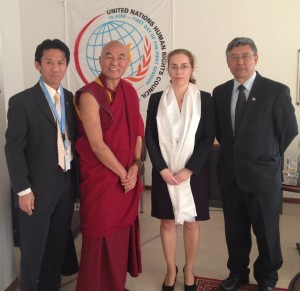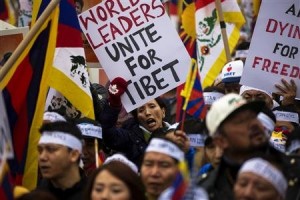On 10 December, Tibetan Solidarity Day was marked across the world with demonstrations and rallies in support of Tibetan independence. The Day comes after a period of heightened unrest in Tibet, characterized by a wave of self-immolations protesting Chinese policies. Over the last three years 95 Tibetan monastic and lay people have set themselves on fire in an effort to bring attention to Chinese Human Rights violations. Thirty-three of these self-immolations occurred in November and December.
On Sunday 9 December, thousands of Tibetans and their supporters rallied in New York at Daj Hammerskjold plaza outside the United Nations and in front of the Chinese embassy. A Tibetan delegation, led by exile Tibetan MPs Mr Norbu Tsering and Mr Tashi Namgyal delivered a petition to the Office of the UN High Commissioner for Human Rights signed by some 351,000 people from more than 90 countries demanding that the UN fulfill the resolutions passed in 1959, 1960, and 1965, send a fact finding mission to Tibet, and ensure that the “basic aspirations of the Tibetan people are fulfilled.” The demonstrations in New York were accompanied by rallies across the globe. In Europe, crowds gathered in Brussels in front of the European High Commission, as well as in Amsterdam and Barcelona. A small vigil was held in Moscow, while across India Tibetans and their supporters held vigils and marches.
The impact of the self-immolations has reached beyond the Tibetan community, as policymakers in the European Union and United States have reacted to the issue over the past few weeks. Catherine Ashton, the EU High Representative, issued a statement calling for the Chinese “to address the deep-rooted causes of the frustration of the Tibetan people” while also calling on Tibetans to “refrain from resorting to extreme forms of protest, such as self-immolation.”

Mr Tenzin S Kayta, of Tibet Bureau; Ven. Thubten Wangchen, Member of Tibetan Parliament-in-Exile; Mrs Laura Dupuy Lasserre, President of the UN Human Rights Council; and Mr Tseten Samdup Chhoekyapa, H.H. the Dalai Lama’s Representative – in Geneva on 10 December
Members of the European Parliament have also called for the creation of a Special EU Representative on Tibet, in order to ensure the issue is monitored closely. The United Kingdom issued a statement calling for the “resumption of meaningful dialogue to resolve the underlying grievances of Tibetan communities.”
The United States echoed the EUs statement, urging “the Chinese Government at all levels to address policies in Tibetan areas that have created tensions and threaten the distinct religious, cultural, and linguistic identity of the Tibetan people.” The United States under President Obama’s leadership has publically announced a “pivot” to Asia, and seeks to promote cooperation among its allies in the region. It has called the EU declaration a good example of the United States and Europe working together to “build new relationships in Asia.” Undersecretary of State Maria Otero, who is also the US State Department’s Special Coordinator for Tibetan Issues, emphasized the US’s continuing commitment to Tibetan Human Rights, stating “The United States government has consistently urged the Chinese government to address policies in Tibetan areas that have created tensions.”
While the recent rise is self-immolations has spurred renewed interest and a flurry of international commentary, it is important to note that the US and EU declarations do not represent a change in their respective stated positions on the issue. In 2008 in response to riots in Lhasa the US senate passed a resolution calling for earnest negotiations and emphasizing the importance of Human Rights.





 Print
Print Email
Email